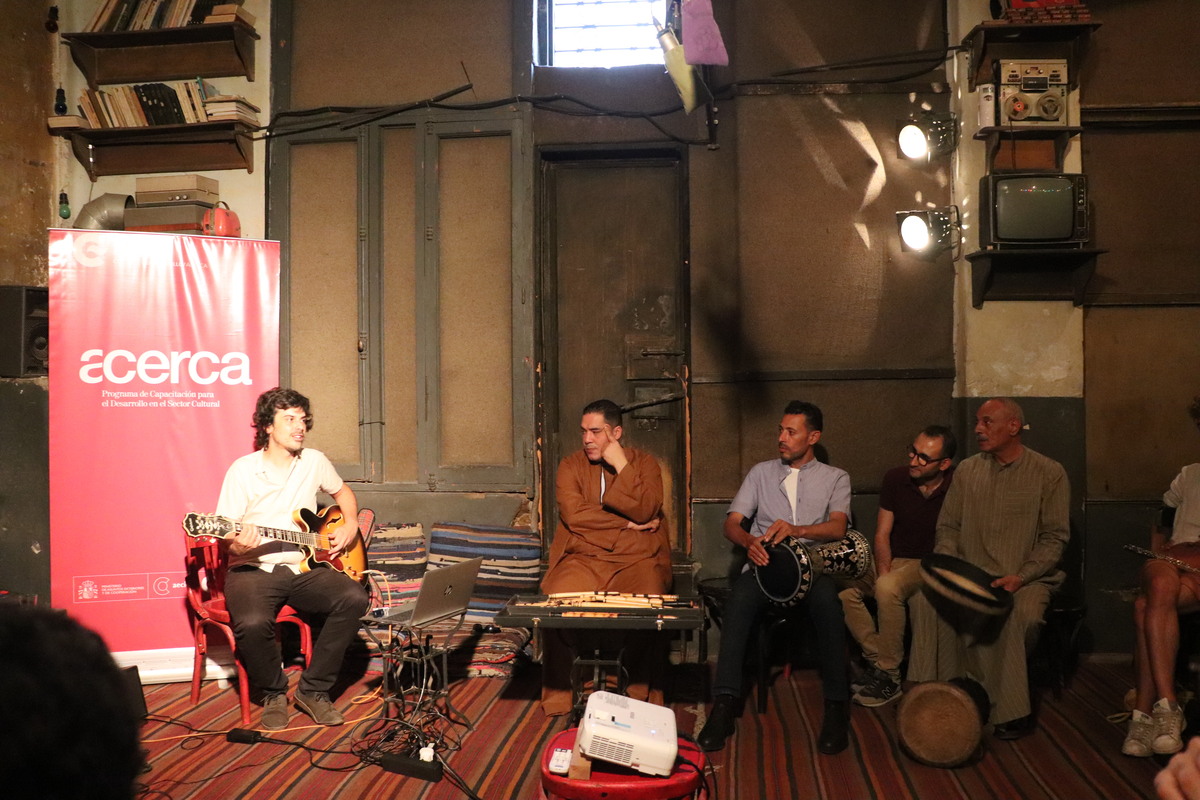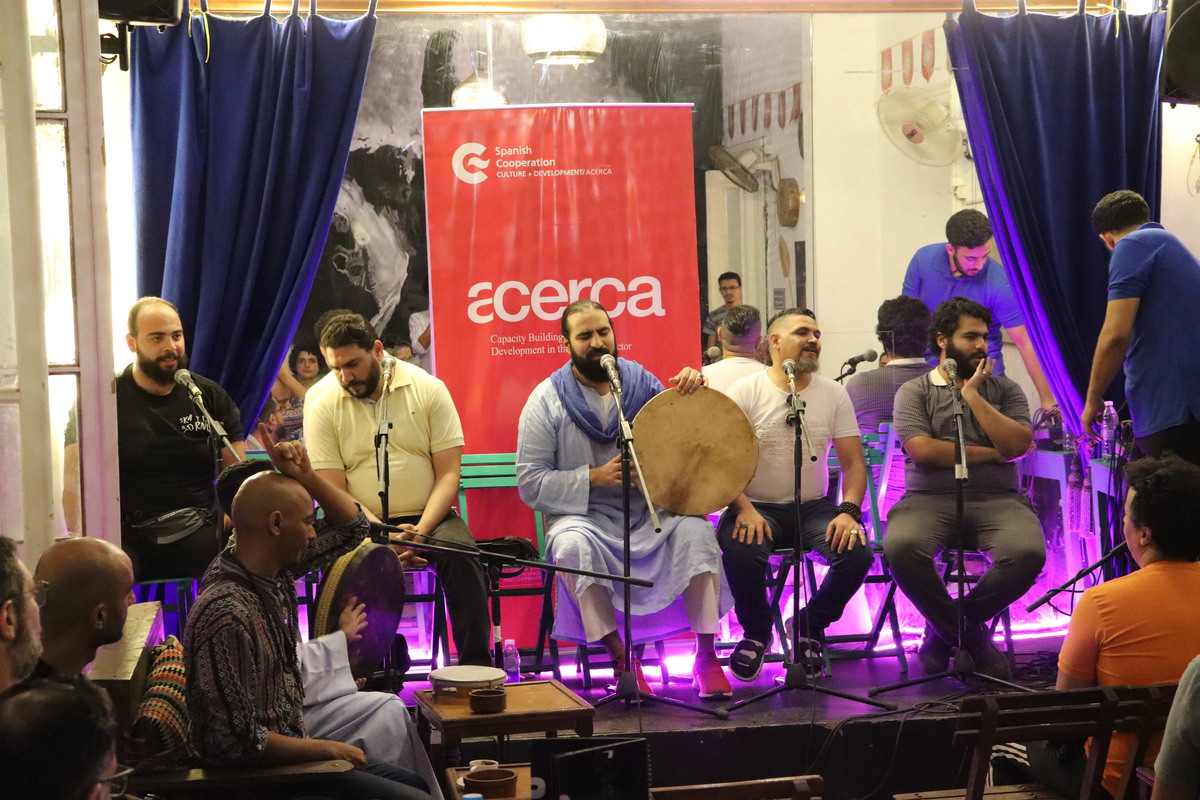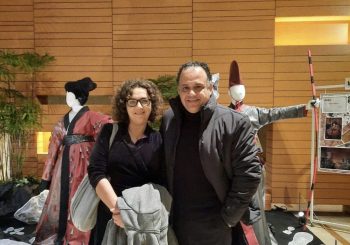As music plays a role in preserving cultural memory – bridging the past and present – it is the need of the hour for intercultural dialogue that protects past heritage, and promotes the renewal of heritage to keep it alive and relevant for modern times.
“Music has its own map that goes beyond borders,” Spanish artist Luis Gimenez Amoros tells Egyptian Streets. Amoros is specialized in fusing Spanish sound with Afroasiatic music.
“There is a lot of conversation right now about division and the division between the South and the North, but I think there is also a common horizon that shows that we are all still working together. Music, without words, brings about a very hopeful and optimistic narrative.”
Revitalizing the ethos of multiculturalism between Spain and Egypt, the Spanish Cooperation in Egypt, in collaboration with Makan (Egyptian Center for Culture and Arts), hosted a two-week workshop titled “The Unknown Spanish Levant: Musical/Historical Circulation from Spain to Egypt” with artist Luis Gimenez Amoros.
In the first week, participants of the workshop explored the interlinkage between current Spanish and Egyptian music, observing the music from different angles, including historic, theoretical, and analytical. The workshop encouraged different artists from Egypt and Europe to collaborate on musical pieces in order to develop their own musical comprehension. In the second week, participants partook in recording and performing practices and translated their theoretical knowledge into live performances.

“This workshop is very important because it promotes renewal in Egyptian art and music heritage. We focus on preserving folk and traditional arts, documenting them to later study more deeply. But this workshop brought about new sounds and new styles of music, not just outside of folk and traditional music, but also outside of Egypt as a whole. It definitely brings about a new understanding of our musical heritage,” says Ahmed Elmaghraby, founder and director of the Egyptian Center for Culture and Arts at Makan.
Inside the walls of Makan was a room filled with diverse people from all over the world, dancing, cheering, and swaying along to the distinctive sound of the Spanish guitar fused with Egyptian instruments, such as finger cymbals, the flute, and the drums. Capturing the ocean of diversity through one melody, the performance reverberated waves of sound that stretched across the Mediterranean, creating an imaginary place where cultures intersect.
“Cultural circulation reveals to us that perhaps we need someone else to tell us where we come from,” Amoros shares.
“There is a quote from one of my favorite films, named the Apu Trilogy, which said ‘if you talk about your village, you talk about the world’. Somehow, it was very inspiring for me. My albums revolved around this key message, particularly the album Middle Passage, which refers to the forced migration of millions around the period of the 14th century, and the many musical styles that were developed during that time due to the cross-cultural influences that occurred between Asia, Europe and Africa,” Amoros adds.
Currently presenting his trilogy album, titled ‘The Unknown Spanish Levant’, which was recorded in Mexico, Spain and Egypt, Amoros teaches the musical styles included in the album in the workshops to illustrate the intercultural rhetoric of ancient Andalusi/Levantine music, and the commonalities that exist between Spanish, Latin American and African music.
As a teenager in Spain, Amoros was mostly exposed to protest music, which developed a sensitivity for other cultures within him, and an emotional drive to visit the refugee camps in the Sahrawi. It was these camps that marked a turning point in his career, as he was introduced to different musical styles and realized that there was a lot in common between Spain and North African cultures.
“I realized that there is a cultural circulation [of] more than identities, and one example of commonality is the common lament that exists in the music of the two cultures.”
Participants in the workshop have also been influenced not just musically, but also personally and culturally. Both Toqa Elhagrassy, who plays the qanun, and Mohammed Nabil, who plays the piano and the harmonica, have developed their musical knowledge and styles as a result of the workshops, and have also enriched their understanding of their local culture and identity.

“I was only exposed to Western music from a young age, and so this workshop helped me use more Eastern sounds in my music and bring me closer to my North African [heritage],” Nabil says.
“I’ve been playing music for 20 years and I focus more on classical Egyptian music, like Abdel Halim Hafez and Oum Kalthoum, but these workshops have definitely enhanced my musical memory and taught me to incorporate Spanish musical styles within the Egyptian style as well, which creates a very different mix that allows me as a musician to develop new tunes,” Elhagrassy adds.
While it is difficult to imagine a truly global culture in our world today, the works of Luis Gimenez Amoros serve to remind us that there is value in creating an imaginary place that produces hopeful narratives and implants the ideas of multiculturalism that renew our intangible heritage.






Comments (0)